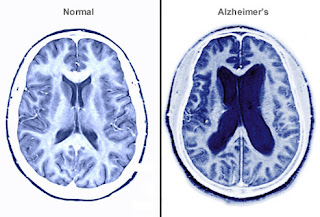Alzheimer Disease
Few people might assume or think that Alzheimer’s brings about brain death. In other words, it will
cause the entire brain to stop working. It is not correct.
Overview
Alzheimer is a progressive health problem that damages memory along with other crucial mental
functions. Treatment can assist,
but this disease can’t
be eradicated. Brain cell
connections and the cells themselves degenerate and die, eventually damaging memory and other significant mental functions.
Alzheimer’s
and the brain
The human
brain carries 100 billion nerve cells ( neurons ) . Every nerve cell links with many others to form communication
networks. Groups of nerve cells do unique duties. A
few take part in thinking, learning and remembering. Some
others assist us see, hear and smell.
To perform their function, brain cells operate like small factories. They get supplies, generate energy, construct equipment
and eliminate waste. Cells
also process and store information and interact with various other cells. Holding every
thing functioning needs co-ordination as well as large amounts of fuel and oxygen.
Researchers believe
Alzheimer’s disease stops areas
of a cell’s factory from functioning properly.
They are unsure where
the problem begins. But identical to a real factory, backups and breakdowns in
a single system bring about problems in other areas. As affect spreads, cells get rid of their capability to perform their tasks and, eventually die, causing irreversible
changes in the brain.
Alzheimer’s
Disease Symptoms
To get a diagnosis of Alzheimer’s, the particular
person must have experienced a drop in cognitive or behavioural function and overall
performance compared with how they were formerly. This decline must
interfere with their capability to perform at the workplace or in common activities.
- Decreased capability to take in and memorize new information.
- Impairments to reasoning, difficult tasking, and exercising judgment.
- Impaired visuospatial capabilities.
- Impaired talking, reading and writing.
- Changes in personality and behavior.
Alzheimer’s
Disease Causes
Researchers believe
that for many people, Alzheimer’s disease is due to a mixture of genetic, life-style and
environmental factors that impact the
brain over time.
When doctors analyze Alzheimer’s brain tissue under the microscope,
they find two kinds of abnormalities that are considered hallmarks
of the disease.
- Plaques : These kind of clumps of a protein named beta-amyloid may damage and destroy brain cells in many ways, including interfering with cell-to-cell connection. Although the ultimate reason for brain-cell death in Alzheimer’s isn’t known, the collection of beta-amyloid on the outside of brain cells is a prime suspect.
- Tangles : Brain cells depend on an internal help and transport system to carry nutrients and other vital components throughout their long extensions This method needs the normal structure and functioning of a protein known as tau.In Alzheimer’s, threads of tau protein twist into abnormal tangles inside brain tissues, resulting in failure of the transport system. This failure is also highly implicated in the decrease and death of brain cells.
Alzheimer’s
Disease Complications
The most common complications that
include Alzheimer’s disease are,
- Some people have difficulty swallowing,
- Others get rid of the ability to walk,
- Some can no longer go to the toilet,
- Patients turn into a lot more vulnerable to infections.
Treatments
for Alzheimer’s Disease
Right this moment, there
is not any cure for Alzheimer’s disease.
Once a person begins showing
signs of memory loss and troubles with learning,
judgment, communication, and everyday life. Presently there aren’t
any treatments that can stop or reverse them.
However there
are medications that can
ease a few of the symptoms in
some people. They are able to reduce how immediately the disease gets worse, and help the brain
work better for longer. It’s important to talk with your doctor regarding which option may work ideal for
you.
Lifelong
learning and social engagement
Research studies have found
an association between life-long participation in mentally and socially stimulating
activities and a minimized risk
of Alzheimer’s disease. Low education and learning levels, less than a high school
education seem to be a
risk cause of Alzheimer’s
disease.


0 Comments:
Post a Comment
Subscribe to Post Comments [Atom]
<< Home